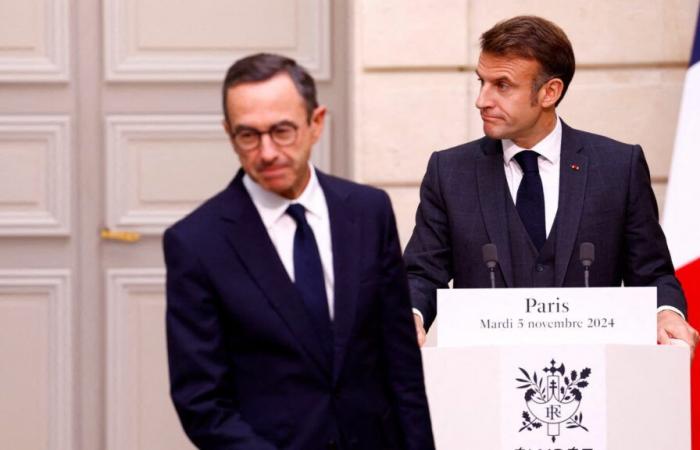The Minister of the Interior criticizes a Franco-Algerian text which facilitates the granting of residence permits. But the file is not in these hands but in those of Emmanuel Macron who, until now, has always refused to go into the field of renegotiation or repeal.
The agreements between France and Algeria in the crosshairs of the right. The Minister of the Interior once again called for an end to this treaty which facilitates the installation of Algerian nationals.
“Algeria has not respected international law and cannot offend France with impunity. A certain number of measures, such as the end of the 1968 agreement, must be considered,” judged Bruno Retailleau this Sunday, January 19 on BFMTV.
“Not a miracle recipe”
If this is not the first time that the tenant of Place Beauvau has asked for the maintenance of this treaty between Algiers and Paris, French diplomacy has so far refrained from responding directly to him. It is now done.
“It is at the Quai d'Orsay and under the authority of the President of the Republic that France's foreign policy is forged,” replied Jean-Noël Barrot, the Minister of Foreign Affairs on our antenna this Monday morning .
“It is not a miracle recipe to remove or repeal it. Otherwise, we would have known for a long time,” continued the head of French diplomacy.
For several years, the right and the extreme right have denounced this Franco-Algerian text signed in 1968. But, from Jordan Bardella to Édouard Philippe via Éric Ciotti, criticism has regained strength in recent weeks, between the arrest of the writer Boualem Sansal and the fiasco of the failed expulsion of an Algerian influencer.
This agreement, which came into being six years after the independence of this former French colony, created a unique status for Algerian nationals in terms of movement, residence and employment.
It originally aimed to facilitate economic immigration to meet the strong need for labor in France at the start of the Thirty Glorious Years. Concretely, it now contains measures which relax arrival and issuance of residence permits to Algerian nationals.
The family reunification – this system which allows a foreign national in a legal situation to be able to bring his family (spouse and minor children) – is for example possible from 12 months of presence in France instead of 18 months for foreign nationals.
Leading country in number of residence permits
These specific provisions are reflected in the figures of the Ministry of the Interior. According to a report from the general directorate for foreigners in France646,462 residence permits to Algerian nationals were granted in 2023, far ahead of other countries.
-This agreement is, however, more restrictive than the general regime for foreigners on certain points such as student visas. As for the provisions linked to expulsions such as the issuance of OQTF (obligation to leave French territory), they come under common law.
Macron has always closed the door
These agreements have already been modified three times, gradually gutted with very symbolic measures. The stated objective: to try to bring the status of Algerians closer to common law for foreigners.
Can France decide to end these agreements between France and Algeria as demanded by Bruno Retailleau? Yes, but on condition that Emmanuel Macron agrees. For the moment, the head of state has always closed the door to this hypothesis, despite pressure from his former Prime Minister Édouard Philippe or a proposed resolution tabled in the National Assembly by the right at the winter 2023.
Former Prime Minister Dominique de Villepin also criticized Monday on France Inter the “one-upmanship” of Interior Minister Bruno Retailleau on Algeria, inviting him to let diplomats act and not give in to “temptation of settling accounts.”
Attempting to push the head of state to terminate the treaty
However, nothing prevents the National Assembly or the ministers from trying to put pressure on Emmanuel Macron. With a calculation in mind: to hope that by putting the question of the agreement between France and Algeria back on the table the Head of State does not end up changing his position.
So far, the presidential camp is playing the card of caution. In December 2023, during the full examination of the immigration bill in the National Assembly, the government affirmed, through the voice of Élisabeth Borne, that it was open to a renegotiation of the agreement but not to the end of its agreement.
Algerian gas and oil
If the agreement between Paris and Algiers disappears, the Algerian government could be tempted to take retaliatory measures. Algeria could, for example, considerably reduce the number of consular passes, this document issued by the person's country of origin under a OQTF (obligation to leave French territory) and without which France cannot expel him.
The measure would have a bad effect on Bruno Retailleau who made this question his hobby horse. Should we also see economic reasons to explain Emmanuel Macron's prejudices? Despite strong turbulence between the two countries after a clear warming of relations in recent years, trade between the two countries is doing very well.
In 2023, trade between France has significantly increased, particularly on the gas and oil front. In 2023, Algerian hydrocarbon exports increased by 15% against the backdrop of the war in Ukraine and the desire to reduce French dependence on Russian gas.






